- Home
- Peter Benchley
Jaws Page 4
Jaws Read online
Page 4
Generally, Brody’s contribution to the Amity understanding—in addition to maintaining the rule of law and sound judgment in the town—consisted of suppressing rumors and, in consultation with Harry Meadows, the editor of the Amity Leader, keeping a certain perspective on the rare unfortunate occurrences that qualified as news.
The previous summer’s rapes had been reported in the Leader, but just barely (as molestations), because Brody and Meadows agreed that the specter of a black rapist stalking every female in Amity wouldn’t do much for the tourist trade. In that case, there was the added problem that none of the women who had told the police they had been raped would repeat their stories to anyone else.
If one of the wealthier summer residents of Amity was arrested for drunken driving, Brody was willing, on a first offense, to book him for driving without a license, and that charge would be duly reported in the Leader. But Brody made sure to warn the driver that the second time he was caught driving under the influence he would be charged, booked, and prosecuted for drunk driving.
Brody’s relationship with Meadows was based on a delicate balance. When groups of youngsters came to town from the Hamptons and caused trouble, Meadows was handed every fact—names, ages, and charges lodged. When Amity’s own youth made too much noise at a party, the Leader usually ran a one-paragraph story without names or addresses, informing the public that the police had been called to quell a minor disturbance on, say, Old Mill Road.
Because several summer residents found it fun to subscribe to the Leader year-round, the matter of wintertime vandalism of summer houses was particularly sensitive. For years, Meadows had ignored it—leaving it to Brody to make sure that the homeowner was notified, the offenders punished, and the appropriate repairmen dispatched to the house. But in the winter of 1968 sixteen houses were vandalized within a few weeks. Brody and Meadows agreed that the time had come for a full campaign in the Leader against wintertime vandals. The result was the wiring of forty-eight homes to the police station, which—since the public didn’t know which houses were wired and which weren’t—all but eliminated vandalism, made Brody’s job much easier, and gave Meadows the image of a crusading editor.
Once in a while, Brody and Meadows collided. Meadows was a zealot against the use of narcotics. He was also a man with unusually keen reportorial antennae, and when he sensed a story—one not susceptible to “other considerations”—he would go after it like a pig after truffles. In the summer of 1971 the daughter of one of Amity’s richest families had died off the Scotch Road beach. To Brody, there was no evidence of foul play, and since the family opposed an autopsy, the death was officially listed as drowning.
But Meadows had reason to believe that the girl was on drugs and that she was being supplied by the son of a Polish potato farmer. It took Meadows almost two months to get the story, but in the end he forced an autopsy which proved that at the time she drowned the girl had been unconscious from an overdose of heroin. He also tracked down the pusher and exposed a fairly large drug ring operating in the Amity area. The story reflected badly on Amity and worse on Brody, who, because several federal violations were involved in the case, wasn’t even able to redeem his earlier insouciance by making an arrest or two. And it won Meadows two regional journalism prizes.
Now it was Brody’s turn to press for full disclosure. He intended to close the beaches for a couple of days, to give the shark time to travel far from the Amity shoreline. He didn’t know whether or not sharks could acquire a taste for human flesh (as he had heard tigers do), but he was determined to deprive the fish of any more people. This time he wanted publicity, to make people fear the water and stay away from it.
Brody knew there would be a strong argument against publicizing the attack. Like the rest of the country, Amity was still feeling the effects of the recession. So far, the summer was shaping up as a mediocre one. Rentals were up from last year, but they were not “good” rentals. Many were “groupers,” bands of ten or fifteen young people who came from the city and split the rent on a big house. At least a dozen of the $7,000–$10,000-a-season shorefront houses had not yet been rented, and many more in the $5,000 class were still without leases. Sensational reports of a shark attack might turn mediocrity into disaster.
Still, Brody thought, one death in mid-June, before the crowds come, would probably be quickly forgotten. Certainly it would have less effect than two or three more deaths would. The fish might well have disappeared already, but Brody wasn’t willing to gamble lives on the possibility: the odds might be good, but the stakes were prohibitively high.
He dialed Meadows’ number. “Hey, Harry,” he said. “Free for lunch?”
“I’ve been wondering when you’d call,” said Meadows. “Sure. My place or yours?”
Suddenly Brody wished he hadn’t called at mealtime. His stomach was still groaning, and the thought of food nauseated him. He glanced up at the wall calendar. It was a Thursday. Like all their friends on fixed, tight incomes, the Brodys shopped according to the supermarket specials. Monday’s special was chicken, Tuesday’s lamb, and so forth through the week. As each item was consumed, Ellen would note it on her list and replace it the next week. The only variables were bluefish and bass, which were inserted in the menu when a friendly fisherman dropped his overage by the house. Thursday’s special was hamburger, and Brody had seen enough chopped meat for one day.
“Yours,” he said. “Why don’t we order out from Cy’s? We can eat in your office.”
“Fine with me,” said Meadows. “What do you want? I’ll order now.”
“Egg salad, I guess, and a glass of milk. I’ll be right there.” Brody called Ellen to tell her he wouldn’t be home for lunch.
Harry Meadows was an immense man, for whom the act of drawing breath was exertion enough to cause perspiration to dot his forehead. He was in his late forties, ate too much, chain-smoked cheap cigars, drank bonded Bourbon, and was, in the words of his doctor, the Western world’s leading candidate for a huge coronary infarction.
When Brody arrived, Meadows was standing beside his desk, waving a towel at the open window. “In deference to what your lunch order tells me is a tender stomach,” he said, “I am trying to clear the air of essence of White Owl.”
“I appreciate that,” said Brody. He glanced around the small, cluttered room, searching for a place to sit.
“Just throw that crap off the chair there,” Meadows said. “They’re just government reports. Reports from the county, reports from the state, reports from the highway commission and the water commission. They probably cost about a million dollars, and from an informational point of view they don’t amount to a cup of spit.”
Brody picked up the heap of papers and piled them atop a radiator. He pulled the chair next to Meadows’ desk and sat down.
Meadows rooted around in a large brown paper bag, pulled out a plastic cup and a cellophane-wrapped sandwich, and slid them across the desk to Brody. Then he began to unwrap his own lunch, four separate packages which he opened and spread before himself with the loving care of a jeweler showing off rare gems: a meatball hero, oozing tomato sauce; a plastic carton filled with oily fried potatoes; a dill pickle the size of a small squash; and a quarter of a lemon meringue pie. He reached behind his chair and from a small refrigerator withdrew a sixteen-ounce can of beer. “Delightful,” he said with a smile as he surveyed the feast before him.
“Amazing,” said Brody, stifling an acid belch. “Absofuckinlutely amazing. I must have had about a thousand meals with you, Harry, but I still can’t get used to it.”
“Everyone has his little quirks, my friend,” Meadows said as he lifted his sandwich. “Some people chase other people’s wives. Some lose themselves in whiskey. I find my solace in nature’s own nourishment.”
“That’ll be some solace to Dorothy when your heart says, ‘That’s enough, buster, adiós.’ ”
“We’ve discussed that, Dorothy and I,” said Meadows, filtering the words through a mouthful o
f bread and meat, “and we agree that one of the few advantages man has over other animals is the ability to choose the way to bring on his own death. Food may well kill me, but it’s also what has made life such a pleasure. Besides, I’d rather go my way than end up in the belly of a shark. After this morning, I’m sure you’ll agree.”
Brody was in the midst of swallowing a bite of egg salad sandwich, and he had to force it past a rising gag. “Don’t do that to me,” he said.
They ate in silence for a few moments. Brody finished his sandwich and milk, wadded the sandwich wrapper and stuffed it into the plastic cup. He leaned back and lit a cigarette. Meadows was still eating, but Brody knew his appetite wouldn’t be diminished by any discussion. He recalled a time when Meadows had visited the scene of a bloody automobile accident and proceeded to interview police and survivors while sucking on a coconut Popsicle.
“About the Watkins thing,” Brody said. “I have a couple of thoughts, if you want to hear them.” Meadows nodded. “First, it seems to me that the cause of death is cut-and-dried. I’ve already talked to Santos, and—”
“I did, too.”
“So you know what he thinks. It was a shark attack, clear and simple. And if you’d seen the body, you’d agree. There’s just no—”
“I did see it.”
Brody was astonished, mostly because he couldn’t imagine how anyone who had seen that mess could be sitting there now, licking lemon-pie filling off his fingers. “So you agree?”
“Yes. I agree that’s what killed her. But there are a few things I’m not so sure of.”
“Like what?”
“Like why she was swimming at that time of night. Do you know what the temperature was at around midnight? Sixty. Do you know what the water temperature was? About fifty. You’d have to be out of your mind to go swimming under those conditions.”
“Or drunk,” said Brody, “which she probably was.”
“Maybe. No, you’re right—probably. I’ve checked around a little, and the Footes don’t mess with grass or mescaline or any of that stuff. There’s one other thing that bothers me, though.”
Brody was annoyed. “For Christ’s sake, Harry, stop chasing shadows. Once in a while, people do die by accident.”
“It’s not that. It’s just that it’s damn funny that we’ve got a shark around here when the water’s still this cold.”
“Is it? Maybe there are sharks who like cold water. Who knows about sharks?”
“There are some. There’s the Greenland shark, but they never come down this far, and even if they did, they don’t usually bother people. Who knows about sharks? I’ll tell you this: At the moment I know a hell of a lot more about them than I did this morning. After I saw what was left of Miss Watkins, I called a young guy I know up at the Woods Hole Oceanographic Institute. I described the body to him, and he said it’s likely that only one kind of shark would do a job like that.”
“What kind?”
“A great white. There are others that attack people, like tigers and hammerheads and maybe even makos and blues, but this fellow Hooper—Matt Hooper—told me that to cut a woman in half like that you’d have to have a fish with a mouth like this”—he spread his hands about three feet apart—“and the only shark that grows that big and attacks people is the great white. There’s another name for them.”
“Oh?” Brody was beginning to lose interest. “What’s that?”
“Man-eater. Other sharks kill people once in a while, for all sorts of reasons—hunger, maybe, or confusion or because they smell blood in the water. By the way, did the Watkins girl have her period last night?”
“How the hell would I know?”
“Just curious. Hooper said that’s one way to guarantee yourself an attack if there’s a shark around.”
“What did he say about the cold water?”
“That it’s quite common for a great white to come into water this cold. Some years ago, a boy was killed by one near San Francisco. The water temperature was fifty-seven.”
Brody sucked a long drag from his cigarette and said, “You’ve really done a lot of checking into this, Harry.”
“It seemed to me a matter of—shall we say—common sense and public interest to determine exactly what happened and the chances of it happening again.”
“And did you determine those chances?”
“I did. They’re almost nonexistent. From what I can gather, this was a real freak accident. According to Hooper, the only thing good about great whites is that they’re scarce. There’s every reason to believe that the shark that attacked the Watkins girl is long gone. There are no reefs around here. There’s no fish-processing plant or slaughterhouse that dumps blood or guts into the water. So there’s nothing at all to keep the shark interested.” Meadows paused and looked at Brody, who returned his gaze silently. “So it seems to me, Martin, that there’s no reason to get the public all upset over something that’s almost sure not to happen again.”
“That’s one way to look at it, Harry. Another is that since it’s not likely to happen again, there’s no harm in telling people that it did happen this once.”
Meadows sighed. “Journalistically, you may be right. But I think this is one of those times, Martin, when we have to forget the book and think of what’s best for the people. I don’t think it would be in the public interest to spread this around. I’m not thinking about the townspeople. They’ll know about it soon enough, the ones that don’t know already. But what about the people who read the Leader in New York or Philadelphia or Cleveland?”
“You flatter yourself.”
“Balls. You know what I mean. And you know what the real estate situation is like around here this summer. We’re right on the edge, and other places are, too, like Nantucket and the Vineyard and East Hampton. There are people who still haven’t made their summer plans. They know they’ve got their pick of places this year. There’s no shortage of houses for rent … anywhere. If I run a story saying that a young woman was bitten in two by a monster shark off Amity, there won’t be another house rented in this town. Sharks are like ax-murderers, Martin. People react to them with their guts. There’s something crazy and evil and uncontrollable about them. If we tell people there’s a killer shark around here, we can kiss the summer good-bye.”
Brody nodded. “I can’t argue with that, Harry, and I don’t want to tell the people that there is a killer shark around here. Look at it from my point of view, just for a second. I won’t dispute your odds or anything. You’re probably right. That shark has probably gone a hundred miles from here and won’t ever show up again. The most dangerous thing out there in the water is probably the undertow. But, Harry, there’s a chance you’re wrong, and I don’t think we can take that chance. Suppose—just suppose—we don’t say a word, and somebody else gets hit by that fish. What then? My ass is in a sling. I’m supposed to protect people around here, and if I can’t protect them from something, the least I can do is warn them that there is a danger. Your ass is in a sling, too. You’re supposed to report the news, and there’s just no question but that someone killed by a shark is news. I want you to run the story, Harry. I want to close the beaches, just for a couple of days, and just for insurance’s sake. It won’t be a great inconvenience to anybody. There aren’t that many people here yet, and the water’s cold. If we tell it straight, tell people what happened and why we’re doing what we’re doing, I think we’ll be way ahead.”
Meadows sat back in his chair and thought for a moment. “I can’t speak for your job, Martin, but as far as mine is concerned, the decision has already been made.”
“What does that mean?”
“There won’t be any story about the attack in the Leader.”
“Just like that.”
“Well, not exactly. It wasn’t entirely my decision, though I think that generally I agree with it. I’m the editor of this paper, Martin, and I own a piece of it, but not a big enough piece to buck certain pressures.”
&nb
sp; “Such as?”
“I’ve gotten six phone calls already this morning. Five were from advertisers—one restaurant, one hotel, two real estate firms, and an ice cream shop. They were most anxious to know whether or not I planned to run a story on the Watkins thing, and most anxious to let me know they felt Amity would best be served by letting the whole thing fade quietly away. The sixth call was from Mr. Coleman in New York. Mr. Coleman who owns fifty-five per cent of the Leader. It seems Mr. Coleman had received a few phone calls himself. He told me there would be no story in the Leader.”
“I don’t suppose he said whether the fact that his wife is a real estate broker had anything to do with his decision.”
“No,” said Meadows. “The subject never came up.”
“Figures. Well, Harry, where does that leave us? You’re not going to run a story, so as far as the good readers of the Leader are concerned, nothing ever happened. I’m going to close the beaches and put up a few signs saying why.”
“Okay, Martin. That’s your decision. But let me remind you of something. You’re an elected official, right?”
“Just like the President. For four thrill-filled years.”
“Elected officials can be impeached.”
“Is that a threat, Harry?”
Meadows smiled. “You know better than that. Besides, who am I to be making threats? I just want you to be aware of what you’re doing before you tinker with the lifeblood of all those sage and discriminating souls who elected you.”
Brody rose to go. “Thanks, Harry. I’ve always heard it’s lonely here at the top. What do I owe you for lunch?”
“Forget it. I couldn’t take money from a man whose family will soon be begging for food stamps.”
Brody laughed. “No way. Haven’t you heard? The great thing about police work is the security.”
Ten minutes after Brody returned to his office, the intercom buzzer sounded and a voice announced, “The mayor’s here to see you, Chief.”

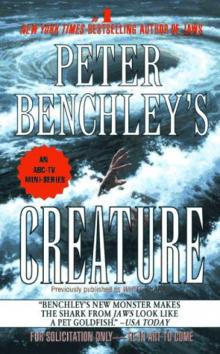 Peter Benchley's Creature
Peter Benchley's Creature The Island
The Island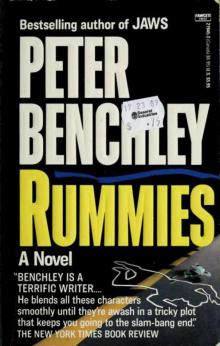 Rummies
Rummies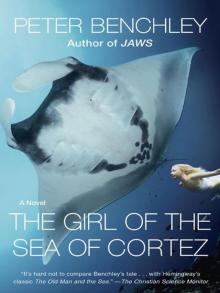 The Girl of the Sea of Cortez: A Novel
The Girl of the Sea of Cortez: A Novel Time and a Ticket
Time and a Ticket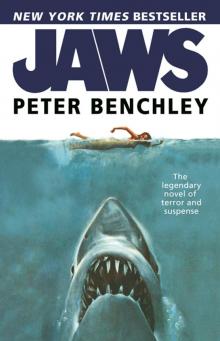 Jaws
Jaws The Deep
The Deep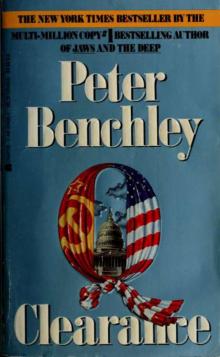 Q Clearance
Q Clearance Shark Trouble: True Stories and Lessons About the Sea
Shark Trouble: True Stories and Lessons About the Sea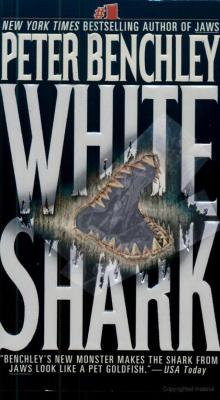 White Shark
White Shark Shark Trouble
Shark Trouble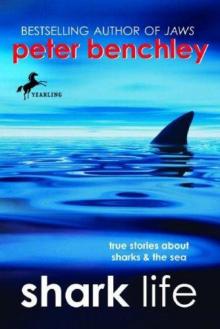 Shark Life: True Stories About Sharks & the Sea
Shark Life: True Stories About Sharks & the Sea